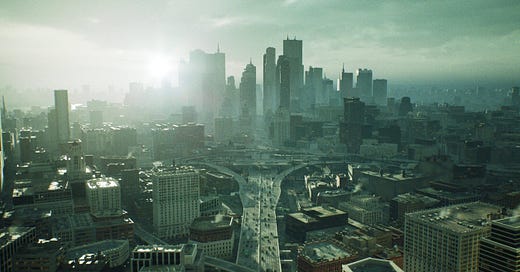Emergency Prices
I hear a lot about "that asshole that bought up all the hand sanitizer and has a garage-full that he can't sell now." And how he (and others like him) deserve punishment. This seems wrong to me. The real villain is the retailers that didn't increase their prices as soon as it was apparent there would be a run on hand sanitizer. (Except actually, it's the American Public)
At some point it became incredibly obvious to everyone in the nation that certain goods were about to become EXTREMELY in demand. Everyone would want them all at once. When this happens the best thing to happen is for the price of these to rise, for several reasons.
1. People will buy less. When hand sanitizer is $1/bottle and the masses are worried they'll run out, they will fill their shopping carts to the brim with just that. It promptly runs out. Surprise. When hand sanitizer is $10/bottle, they'll still buy a few, but leave a whole lot more to the next person. During a shortage, we WANT everyone to buy less. The mass public seems to think a few guys with a few crates of hand sanitizers in their garage stripped the entire country bare. This is laughable after a single minute of thought. The problem is everyone alive buys 100 bottles all at once so they'll "have enough to ride this out." It's just enough for their family's own personal use, of course, so it's ok...
2. Substitute goods become viable. Distilled liquor can be made into hand sanitizer fairly easily. But it's not cheap to do so, both because the liquor is more expensive, and because these distilleries are small operations rather than giant bottling factories. Right now, some distilleries are making hand sanitizer for their local communities and giving it out for free. They can't afford to do so for very long, though. If the price of hand sanitizer were allowed to rise, more distilleries would be converted, and this could be a sustainable source of sanitizer for much longer.
Likewise, as surgical masks run out, people have been posting instruction on how to make DIY fabric face masks. Thank goodness these are technically a different product than disposable surgical masks, people are actually allowed to sell them at a profit.
3. Excess stockpiles are released. I pick up my toilet paper from Costco, which means that once every four months I get a four month supply. I still had 6+ weeks left when this hit. If the price got high enough, and it was legal, I would have been willing to part with half that on ebay. I'm willing to bet shelves will be restocked before I run out, and if not, well, that was a risk I took. But seeing as that's not how this world works, I'm just sitting on my excess toilet paper. :/
4. Resources are moved from where they are in excess to where they are short. When Hurricane Katrina hit, a guy in Kentucky bought 19 generators. He and his family then rented a U-Haul and drove 600 miles to an area of Mississippi left without power. He offered to sell his generators for twice what he had paid for them. People wanted to pay, but he was arrested, thrown in a cage for four days, and his generators were confiscated. Are there towns in the middle of the country that are unaffected by coronavirus with extra supplies that cities in need could really use? Would the people there be willing to invest some labor and some of their money into getting those supplies where people will be happy to pay 5x more for them? Probably, but we'll never know, because then those people would be locked in cages and their investments taken from them.
All these are just immediate effects in the first few days of a shortage crisis. And yet, none of this is allowed to happen. Retailers will not raise their prices because they are afraid of the public backlash, they can't take the reputation hit. "That asshole" doesn't care about his reputation, he's not in this for the long haul. His work is to bring the prices to where they should be so that society can reap all the benefits of items 1 - 4. He's making sure that people will buy only what they really need, rather than stocking up at the worst possible time. He's ensuring that the places that REALLY need the sanitizer can get it! He's bringing more expensive substitute goods into existence by allowing them to be sold sustainably. He's encouraging others to release their stockpiles. He's encouraging areas with excess to export into areas that need the sanitizer. What an asshole!
And because all of this takes investment money, and work, and causes the entire country to hate you, he pockets the difference between the retailer's cowardly Stripped Shelves Prices, and the true Emergency Price. It is very inefficient, yes. It's so inefficient, that the prices he'll charge are probably a lot higher than what the Emergency Price would really be, if the retailers themselves had the courage to actually price the products at their correct Emergency Prices. A lot of people will end up paying a lot more than they would have otherwise, and most people will be stuck with nothing at all, because one garage can't supply even half of one suburb, much less a whole state. But retailers are cowards, so that's what we're left with.
Except we wouldn't be, if people weren't such selfish jerks and wouldn't riot over Emergency Pricing. It's an Emergency, but they refuse to pay more to get supplies that are in huge demand. They're used to getting everything cheap, and now. And what's worse, they demand laws that make Emergency Pricing illegal, they call it "gouging" to make it sound bad, and they'll get men with guns to take away any product sold at such prices and jail the people bringing it to market.
So you get what we have here, pictured. Which is the way they want it. Well, they get it.
Yes, there are times when "gouging" can be evil. A spike in prices of scarce goods that are in high demand in a emergency is not such a time.








